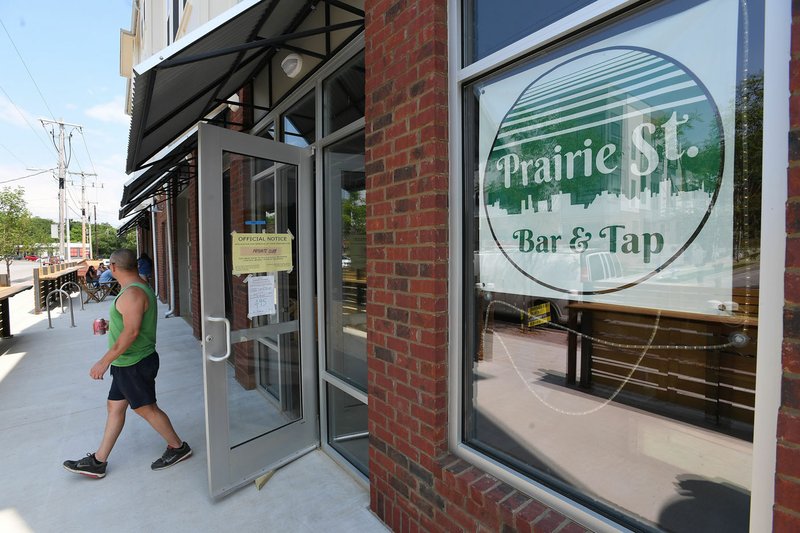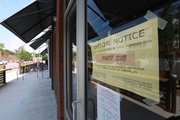FAYETTEVILLE -- Anyone who wants to open a bar serving liquor in the city needs to take eight hours of security training, learn how to spot a fake ID and install surveillance cameras, along with the usual state requirements.
What most people think of as a bar in Arkansas -- an establishment serving beer, wine and mixed drinks that stays open until 2 a.m. -- is legally considered a private club. There are 42 private club permits active in the city.
The basic permitting process for a private-club applicant has been in place since 1969 with a few slight changes, according to Scott Hardin, spokesman for the Arkansas Department of Finance and Administration. The permit requires having a stated purpose other than drinking, at least 100 registered members and an associated nonprofit corporation.
It's an admittedly archaic process, said Fayetteville lawyer Kenneth Mourton. Someone who wants to open a drinking establishment in a wet county, such as Washington County, essentially has three options, he said.
He could open a beer bar. Those have to close at 1 a.m., per city code. Think White Star Tavern on South School Avenue.
He could open a restaurant and get a mixed-drink license. Most of the revenue has to come from food sales, and the place has to have a full kitchen. Most prospective bar owners don't want to go through that, Mourton said. The license also covers hotels and motels.
Which leaves the private-club option. A change in state law that took effect in August requires a private-club applicant to get approval from the local governing body before submitting paperwork to the state for a liquor license.
The law
Arkansas code defines a private club as:
“… a nonprofit corporation organized and existing under the laws of this state, no part of the net revenues of which shall inure directly or indirectly to the benefit of any of its members or any other individual, except for the payment of bona fide expenses of the club’s operations, and which is conducted for some common recreational, social, patriotic, political, national, benevolent, athletic, community hospitality, professional association, entertainment, or other nonprofit object or purpose other than the consumption of alcoholic beverages.”
Source: Arkansas code online
Submit a private-club application
The form to fill out online can be found at bit.ly/fayprivateclubs.
Since then, the City Council has approved four private club applications: The Vault at the EJ Ball Building, VIP Club on West Avenue, Prairie St. Bar & Tap in the Mill District and Roost Motor Club coming to the former Restaurant on the Corner on Arkansas 112.
The city adopted its own ordinance in March to reflect the change in state law about private-club permits. The ordinance lets prospective permit holders submit applications to the city online and defers handling the applications to the Police Department.
The idea is that by the time the City Council puts eyes on the application, the applicant and Police Department will have worked out all the details. Once the application gains approval, it can go to the state. The city will record the license once it gains state approval.
Additionally, private clubs and hotels, motels and restaurants used to have to wait until 10 a.m. before serving alcohol. A May 1 ordinance the council approved changed the time to 7 a.m.
The city's policies have evolved as applications come in. Police Chief Greg Tabor said the department saw the change in law as an opportunity to temper some heavy-handed or violent activity officers had seen on the rise downtown. For instance, 22-year-old Trenton Coney was shot to death on New Year's Eve.
The department originally envisioned having bouncers become licensed private security guards, but only employees working for security firms can get such a license. It's similar to how only a police officer can enroll at the academy.
So the department opted to have the holder of the alcohol permit take the minimum training requirements of a private security officer, as outlined in state code. A number of private security firms have employees who are licensed to teach the 8-hour course.
"We just thought that any training these folks could get who work in these bars would be better than what's been done in the past," which was nothing, Tabor said.
The business owner or manager also has to take the department's fraudulent ID course, which it has offered for a number of years. A multicamera surveillance system also must be installed at the main entrance, bar area and cash register.
Other stipulations include complying with city and state regulations, a recommendation to use mobile apps to easily catch fake IDs and being a good neighbor to surrounding businesses.
Dan Daniel, who runs Prairie St. Bar & Tap, said he's tried a few times to get the security training since the City Council approved his private-club application in April. Scheduling conflicts have prevented Daniel from getting the training, he said.
The language of the policy says the permit holder "shall obtain" the security training, not "has obtained." The City Council amended the policy Tuesday to allow the applicant six months to get the training.
Daniel held off submitting his paperwork to Alcoholic Beverage Control in Little Rock because he thought he had to meet all of the Police Department's criteria first. The state only requires the general approval from the local governing body, and any other conditions are up to the municipality.
The whole situation makes an already confusing process more confusing, Daniel said. He hopes to open the bar next month.
"It'd be really great if there were guidelines -- like a rule book or an instruction book," he said.
Tommy Sisemore, owner of security company MTJD Event Services and director of Bikes, Blues & BBQ, said it's one thing for someone to have the certification to teach the security class but another to volunteer to do it, limiting the options.
Sisemore said he understands the logic of having a permit holder go through the training. Handling a situation as a security guard and handling it as a police officer are very different, and it's easy for someone who isn't trained properly to get out of line, he said.
"Road House was a great movie, but it was Hollywood and a movie," Sisemore said. "There's no reason for you to be kicking people in the face."
The other three major cities and two counties in Northwest Arkansas haven't developed further stipulations outside what state law requires for handling private-club permit applications.
NW News on 06/11/2018



